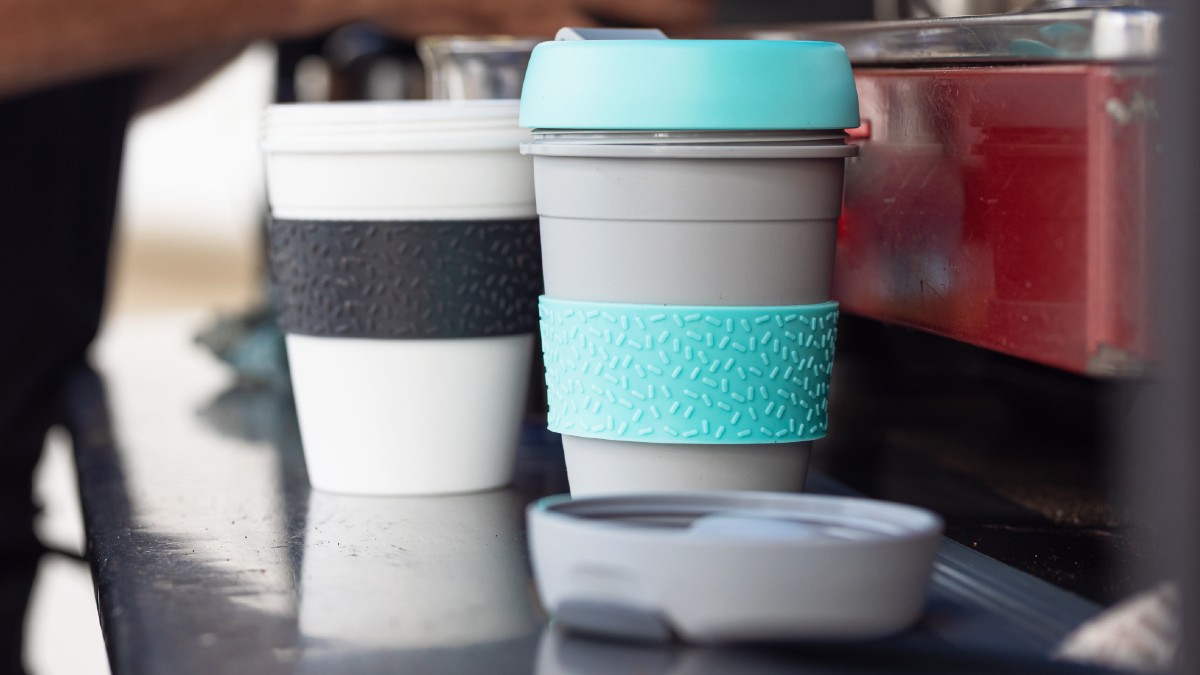Many once common single-use plastic items are now banned in Victoria. Here are sustainable, reusable alternative products to use instead.
Can edible coffee cups help us ditch single-use waste?

Millions of single-use coffee cups enter landfill every day in Australia – could the solution be as simple as eating the evidence?
There’s no denying that Australia is a nation of coffee-lovers. The average Australian consumed about 2kg of coffee in 2021, with the nation’s cafe industry worth an estimated $10.7 billion.
However, our collective love of coffee doesn’t come without a cost. Planet Ark estimates 2.7 million single-use coffee cups are thrown away every single day in Australia, adding up to a whopping one billion cups every year.
Instead of sending all those cups to landfill, what if you could simply eat them?
Catherine Hutchins and Aniyo Rahebi are the founders of Good Edi – a Melbourne-based business trying to tackle Australia’s takeaway coffee cup problem by creating a completely edible alternative.
“We wanted to make a solution that is both convenient, waste free, and truly sustainable,” says Rahebi. “The only thing that we could think of is something that you can eat.”
A coffee cup you can eat… or compost
Hutchins and Rahebi’s Good Edi-cup is a single-use cup made from a “quite secret” blend of oats, grains, flour, bran, vegetable oil, salt and just a touch or sugar.
The result is a vegan, but not gluten-free, disposable vessel that Hutchins describes as tasting “like a waffle cone, except it’s a bit less sweet”, with a relatively neutral flavour profile to avoid affecting the taste of your coffee or drink.
“Some people compare it to a Ryvita biscuit or a Weetbix.”
Unlike Weetbix, however, the cup doesn’t go soggy moments after being doused in milk. Even the slowest sipper should be able to finish their drink without the cup going soft, with crispness ensured for around 40 minutes. The cup can also remain watertight for up to eight hours.
Compared to a conventional coffee cup (which is largely unrecyclable because of the thin plastic veneer internally applied to ensure the paper cup won’t leak) the Good Edi-cup doesn’t use anything artificial in its waterproofing. That means the cup can also be composted like other organic materials – though not many customers choose to go down that route.
“I think at least 50 per cent of people will eat the cup, if not more,” says Hutchins. “When people are drinking their coffee, they pretty much always want to take a bite at least.”
“They realise it’s really delicious and then keep eating it.”

Good Edi cups can stay firm for 40 minutes and remain watertight for up to eight hours. Image: Supplied
The cost of sustainability
On paper, the Good Edi-cup seems to tick all the boxes. Sustainable. Compostable. Tasty. One of the only drawbacks compared to other single-use cups (including ‘biodegradable’ single-use cups) is the price.
The Good Edi website lists a six-pack of its 6oz edible cups for sale at $33, or $5.50 per cup. In comparison, you can buy a carton of 1,000 biodegradable paper cups for just over $100, or around 10c per cup. It’s something Hutchins and Rahebi are aware of and looking to address so that more businesses can make the switch.
“We’re very small scale at the moment, and we’re looking to scale up in the next year or so,” Hutchins says. “At that point we will be able to bring down our wholesale price to a competitive price that will be similar to what a compostable disposable cup is at the moment.”
“We really want to make the product really accessible and affordable for everybody.”
The cost of the cups hasn’t seemed to deter everyone, however, with dozens of cafes across Australia already stocking the cup.
“We are in more than 50 cafes around Australia,” says Rahebi. “In Melbourne, the biggest one is Puzzle Coffee in the CBD.” Other Melbourne cafes stocking the edible coffee cup include Veneziana in Richmond, Hello Sailor in Hawthorn, and Into Coffee in Collingwood.

Reusable coffee cups are a great alternative but they do require a shift in consumer behaviour . Photo: Getty
Keep cup or eat cup?
There are, of course, other solutions to the takeaway coffee cup problem.
Reusable cups have been accepted by cafes for over a decade. These cups are available in a wide variety of sizes, materials and designs, and some venues will even offer customers a discount for bringing their own drinking vessel.
STREAT, a social enterprise café (and RACV corporate partner), takes a slightly different approach.
“STREAT used to offer a 30-cent discount for using a reusable coffee cup, but then we thought – why reward behaviour that every person should be exhibiting?” explains Elise Bennetts, Deputy CEO at STREAT. “Instead, we put a 10-cent charge on requesting a single-use cup. We thought that would cause a lot of blowback. But the feedback we got was overwhelmingly positive. We’ve encouraged a lot of cafés to do the same thing. And it’s making a difference.”
Swapping to a reusable cup does require a shift in consumer behaviour, however, and doesn’t provide an option if customers forget or find reusable cups inaccessible. It’s in this gap that Hutchins, Rahebi see their Good Edi-cup fitting.
“What we are doing is not only providing a solution, but also giving the option for people not to change their behaviour,” Rahebi says. “And also have a snack while they're enjoying their beverages.”


